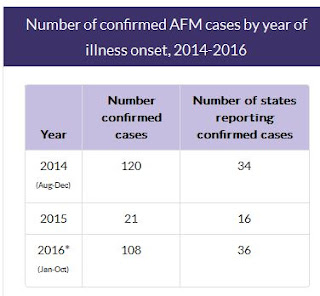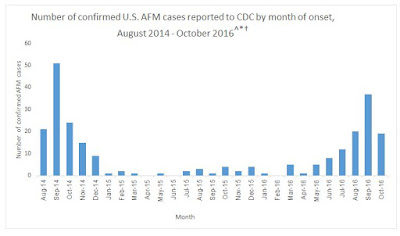#11,976
We've been following an increase in Acute Flaccid Myelitis (AFM) cases across the country over the past few months (see here, here , and here), for which the CDC does not yet have an explanation.
Acute flaccid myelitis (AFM) is a rare illness that affects a person’s nervous system, specifically the spinal cord. AFM may be due to a variety of causes, including viral infection.AFM is a subset of conditions that fall under a broader `umbrella' of syndromes called Acute Flaccid paralysis (AFP), which may include myelitis, peripheral neuropathy, myopathy, Guillain-Barré syndrome (GBS), toxic neuropathy, and other muscle disorders.
The (Updated Dec 1st) chart at the top of this blog shows that so far this year, the CDC has identified 108 cases of AFM from 36 states, a more than 500% increase over 2015, with 19 new cases reported in October.
The initial surge in cases began in August of 2014, concurrent with a nationwide outbreak of EV-D68, a relatively rare non-polio enterovirus that sparked mild to moderate respiratory illness, mostly among children and teenagers.
While a circumstantial case has been posited to link AFM to EV-D68 over the past couple of years (see EID Journal Enterovirus D68 Infection in Children with Acute Flaccid Myelitis, Colorado, USA, 2014), no definitive causal link has been established.
There are many other viruses - including EV-71, West Nile Virus, cytomegalovirus and Epstein-Barr virus, along with some of the adenoviruses - that are known to cause similar neurological symptoms. Although some sporadic cases of EV-D68 infection have been reported this year, earlier in the year the CDC stated:
There is no indication of unusual activity. Enteroviruses are ever-present in the community, and each year we expect to detect cases.That said, we've also been following enterovirus outbreaks around the globe, including new introductions of EV-71 into Europe and a general increase in EV-D68, including:
While some cases of AFM are probably due to severe enterovirus infection, we are still left with the mystery as to what is driving this subtantial rise in AFM cases across the nation.
At a Glance
- CDC is concerned about AFM, a serious illness that we do not know the cause of or how to prevent it.
- CDC is investigating the increase in AFM in 2016. As of October 2016, 108 people in 36 states were confirmed to have AFM.
- Even with an increase in cases in 2016, AFM remains a very rare disease (less than one in a million).
- While the AFM case count for 2016 is less than the 2014 case count, CDC is concerned about the increase in cases in recent months.
- CDC is intensifying efforts to understand the cause and risk factors of AFM.
- It's always important to practice disease prevention steps, like washing your hands, staying up-to-date on vaccines, and protecting yourself from mosquito bites.
What We Know
What we know about the AFM cases reported since August 2014:
- Most patients are children.
- The patients’ symptoms have been most similar to those caused by certain viruses, including poliovirus, non-polio enteroviruses, adenoviruses, and West Nile virus. See a list of viruses associated with AFM.
- Enteroviruses can cause neurologic illness, including meningitis. However, more severe disease, such as encephalitis and AFM, is not common. Rather, they most commonly cause mild illness.
- CDC has tested many different specimens from the patients for a wide range of pathogens (germs) that can cause AFM. To date, we have not consistently detected a pathogen (germ) in the patients’ spinal fluid; a pathogen detected in the spinal fluid would be good evidence to indicate the cause of AFM since this illness affects the spinal cord.
- The increase in AFM cases in 2014 coincided with a national outbreak of severe respiratory illness among people caused by enterovirus D68 (EV-D68). Among the people with AFM, CDC did not consistently detect EV-D68 in the specimens collected from them. In 2015 there were no cases of EV-D68 detected and so far in 2016, only limited sporadic cases of EV-D68 have been detected in the United States.
What We Don't Know
What we don’t know about the AFM cases reported since August 2014:
See Prevention for information about how to protect your family from viral infections that may cause AFM.
- Despite extensive testing, CDC does not yet know the cause of the AFM cases.
- It is unclear what pathogen (germ) or immune response is causing the disruption of signals sent from the nervous system to the muscles causing weakness in the arms and legs.
- CDC has not yet determined who is at higher risk for developing AFM, or the reasons why they may be at higher risk.
What CDC Is Doing
CDC is actively investigating the AFM cases and monitoring disease activity. We are working closely with healthcare providers and state and local health departments to increase awareness and reporting for AFM, and investigate the AFM cases, risk factors, and possible causes of this illness.
CDC activities include:
- encouraging healthcare providers to be vigilant for AFM among their patients, and to report suspected cases to their health departments
- verifying reports of suspected AFM cases submitted by health departments using a case definition adopted by the Council of State and Territorial Epidemiologists (CSTE)
- testing specimens, including stool, blood and cerebrospinal fluid, from people confirmed to have AFM
- working with clinicians and state and local health departments to investigate and better understand the AFM cases, including potential causes and how often the illness occurs
- providing new and updated information to clinicians, health departments, policymakers, the public, and partners in various formats, such as the Morbidity and Mortality Weekly Report, the AFM website, and CDC social media
- pursuing an approach that uses multiple research methods to further explore the potential association of AFM with possible causes as well as risk factors for AFM. This includes collaborating with several medical institutions to review MRI scans of people from the past 10 years to determine how many AFM cases occurred before 2014.

